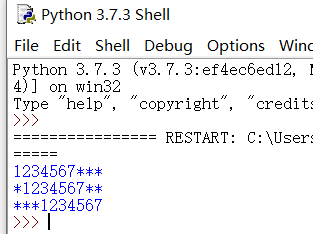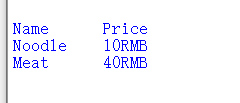Python print输出对齐的问题——解决中文对齐问题
2022-09-18
首先,先简单介绍一下,print自己有对齐的方式
下面的,就是给定字符长度10个字符长度,对齐方式为左边对齐,空余的字符采用 * 填充
string = "1234567" print(string.ljust(10,"*"))
当然了,我整理了三个方式,左右中,一起打印出来了
string = "1234567" print(string.ljust(10,"*"))#左 print(string.center(10,"*"))#中 print(string.rjust(10,"*"))#右

综上就会有一个不错的打印结果如下:
print("\n\n")
print("Name".ljust(10," "),end="")
print("Price".ljust(10," "),end="")
print("")
print("Noodle".ljust(10," "),end="")
print("10RMB".ljust(10," "),end="")
print("")
print("Meat".ljust(10," "),end="")
print("40RMB".ljust(10," "),end="")
print("\n\n")
但是当你将字符换为中文的时候,你就会发现它的结果就不那么尽人意了
print("\n\n")
print("名字".ljust(10," "),end="")
print("价格".ljust(10," "),end="")
print("")
print("面条".ljust(10," "),end="")
print("10元".ljust(10," "),end="")
print("")
print("肉".ljust(10," "),end="")
print("40元".ljust(10," "),end="")
print("\n\n")
原因很简单,因为中文字符默认是全角输出,而英文字符默认为半角, 半角和全角就像英文的 "," 和中文的 "," ,中文的逗号后面会更出一个小空格来,所以造成了这样的不规则
解决方法:
将非半角全部转换为半角,话不多说函数如下,调用方法我写在函数的最顶端了
'''
调用方法
#左边对齐
string1 = "字符串123"
result = duiqi(string1,10,"left")#对齐字符串,长度,对齐方式
print(result)
#右边对齐
string1 = "字符串123"
result = duiqi(string1,10,"right")#对齐字符串,长度,对齐方式
print(result)
#居中对齐这个有点麻烦,例如 “123” ,对齐长度 6 ,要补三个空格,前面一个后面两个还是前面两个后面一个,这个是可以设置的
对齐的方式有 center0 center1 center2
center1:前面的空格更少,后面的更多
center2:后面的空格更少,前面的更多
center0:两边空格一样多(需要字符合理——例: 字符串“123”, 长度为 “5”,不然要报错)
'''
def duiqi(string,length,way):
if(way == "left"):
difference = length - len(string)
if difference == 0: # 若差值为0则不需要补
return string
elif difference < 0:
print('错误:限定的对齐长度小于字符串长度!')
return None
new_string = ''
space = ' '
for i in string:
codes = ord(i) # 将字符转为ASCII或UNICODE编码
if codes <= 126: # 若是半角字符
new_string = new_string + chr(codes+65248) # 则转为全角
else:
new_string = new_string + i # 若是全角,则不转换
return new_string + space*(difference) # 返回补齐空格后的字符串
elif(way == "right"):
difference = length - len(string)
if difference == 0: # 若差值为0则不需要补
return string
elif difference < 0:
print('错误:限定的对齐长度小于字符串长度!')
return None
new_string = ''
space = ' '
for i in string:
codes = ord(i) # 将字符转为ASCII或UNICODE编码
if codes <= 126: # 若是半角字符
new_string = new_string + chr(codes+65248) # 则转为全角
else:
new_string = new_string + i # 若是全角,则不转换
return space*(difference) + new_string # 返回补齐空格后的字符串
elif(way == "center0"):
difference = length - len(string)
if difference == 0: # 若差值为0则不需要补
return string
elif difference < 0:
print('错误:限定的对齐长度小于字符串长度!')
return None
new_string = ''
space = ' '
for i in string:
codes = ord(i) # 将字符转为ASCII或UNICODE编码
if codes <= 126: # 若是半角字符
new_string = new_string + chr(codes+65248) # 则转为全角
else:
new_string = new_string + i # 若是全角,则不转换
return space*(int(difference/2)) + new_string + space*(int(difference/2)) # 返回补齐空格后的字符串
elif(way == "center2"):
difference = length - len(string)
if difference == 0: # 若差值为0则不需要补
return string
elif difference < 0:
print('错误:限定的对齐长度小于字符串长度!')
return None
new_string = ''
space = ' '
for i in string:
codes = ord(i) # 将字符转为ASCII或UNICODE编码
if codes <= 126: # 若是半角字符
new_string = new_string + chr(codes+65248) # 则转为全角
else:
new_string = new_string + i # 若是全角,则不转换
return space*(int(difference/2+1)) + new_string + space*(int(difference/2))
elif(way == "center1"):
difference = length - len(string)
if difference == 0: # 若差值为0则不需要补
return string
elif difference < 0:
print('错误:限定的对齐长度小于字符串长度!')
return None
new_string = ''
space = ' '
for i in string:
codes = ord(i) # 将字符转为ASCII或UNICODE编码
if codes <= 126: # 若是半角字符
new_string = new_string + chr(codes+65248) # 则转为全角
else:
new_string = new_string + i # 若是全角,则不转换
return space*(int(difference/2)) + new_string + space*(int(difference/2 + 1)) # 返回补齐空格后的字符串
elif(way == "center2"):
difference = length - len(string)
if difference == 0: # 若差值为0则不需要补
return string
elif difference < 0:
print('错误:限定的对齐长度小于字符串长度!')
return None
new_string = ''
space = ' '
for i in string:
codes = ord(i) # 将字符转为ASCII或UNICODE编码
if codes <= 126: # 若是半角字符
new_string = new_string + chr(codes+65248) # 则转为全角
else:
new_string = new_string + i # 若是全角,则不转换
return space*(int(difference/2+1)) + new_string + space*(int(difference/2)) # 返回补齐空格后的字符串那么使用了上面的函数后,运行的代码截图就应该为

代码如下:
'''
调用方法
#左边对齐
string1 = "字符串123"
result = duiqi(string1,10,"left")#对齐字符串,长度,对齐方式
print(result)
#右边对齐
string1 = "字符串123"
result = duiqi(string1,10,"right")#对齐字符串,长度,对齐方式
print(result)
#居中对齐这个有点麻烦,例如 “123” ,对齐长度 6 ,要补三个空格,前面一个后面两个还是前面两个后面一个,这个是可以设置的
对齐的方式有 center0 center1 center2
center1:前面的空格更少,后面的更多
center2:后面的空格更少,前面的更多
center0:两边空格一样多(需要字符合理——例: 字符串“123”, 长度为 “5”,不然要报错)
'''
def duiqi(string,length,way):
if(way == "left"):
difference = length - len(string)
if difference == 0: # 若差值为0则不需要补
return string
elif difference < 0:
print('错误:限定的对齐长度小于字符串长度!')
return None
new_string = ''
space = ' '
for i in string:
codes = ord(i) # 将字符转为ASCII或UNICODE编码
if codes <= 126: # 若是半角字符
new_string = new_string + chr(codes+65248) # 则转为全角
else:
new_string = new_string + i # 若是全角,则不转换
return new_string + space*(difference) # 返回补齐空格后的字符串
elif(way == "right"):
difference = length - len(string)
if difference == 0: # 若差值为0则不需要补
return string
elif difference < 0:
print('错误:限定的对齐长度小于字符串长度!')
return None
new_string = ''
space = ' '
for i in string:
codes = ord(i) # 将字符转为ASCII或UNICODE编码
if codes <= 126: # 若是半角字符
new_string = new_string + chr(codes+65248) # 则转为全角
else:
new_string = new_string + i # 若是全角,则不转换
return space*(difference) + new_string # 返回补齐空格后的字符串
elif(way == "center0"):
difference = length - len(string)
if difference == 0: # 若差值为0则不需要补
return string
elif difference < 0:
print('错误:限定的对齐长度小于字符串长度!')
return None
new_string = ''
space = ' '
for i in string:
codes = ord(i) # 将字符转为ASCII或UNICODE编码
if codes <= 126: # 若是半角字符
new_string = new_string + chr(codes+65248) # 则转为全角
else:
new_string = new_string + i # 若是全角,则不转换
return space*(int(difference/2)) + new_string + space*(int(difference/2)) # 返回补齐空格后的字符串
elif(way == "center2"):
difference = length - len(string)
if difference == 0: # 若差值为0则不需要补
return string
elif difference < 0:
print('错误:限定的对齐长度小于字符串长度!')
return None
new_string = ''
space = ' '
for i in string:
codes = ord(i) # 将字符转为ASCII或UNICODE编码
if codes <= 126: # 若是半角字符
new_string = new_string + chr(codes+65248) # 则转为全角
else:
new_string = new_string + i # 若是全角,则不转换
return space*(int(difference/2+1)) + new_string + space*(int(difference/2))
elif(way == "center1"):
difference = length - len(string)
if difference == 0: # 若差值为0则不需要补
return string
elif difference < 0:
print('错误:限定的对齐长度小于字符串长度!')
return None
new_string = ''
space = ' '
for i in string:
codes = ord(i) # 将字符转为ASCII或UNICODE编码
if codes <= 126: # 若是半角字符
new_string = new_string + chr(codes+65248) # 则转为全角
else:
new_string = new_string + i # 若是全角,则不转换
return space*(int(difference/2)) + new_string + space*(int(difference/2 + 1)) # 返回补齐空格后的字符串
elif(way == "center2"):
difference = length - len(string)
if difference == 0: # 若差值为0则不需要补
return string
elif difference < 0:
print('错误:限定的对齐长度小于字符串长度!')
return None
new_string = ''
space = ' '
for i in string:
codes = ord(i) # 将字符转为ASCII或UNICODE编码
if codes <= 126: # 若是半角字符
new_string = new_string + chr(codes+65248) # 则转为全角
else:
new_string = new_string + i # 若是全角,则不转换
return space*(int(difference/2+1)) + new_string + space*(int(difference/2)) # 返回补齐空格后的字符串
print("\n\n")
print(duiqi("名字",10,"left"),end="")
print(duiqi("价格",10,"left"),end="")
print("")
print(duiqi("面条",10,"left"),end="")
print(duiqi("10RMB",10,"left"),end="")
print("")
print(duiqi("肉",10,"left"),end="")
print(duiqi("40RMB",10,"left"),end="")
print("\n\n")
发表评论: